Direct Booking?

Direct Booking?
Kilimanjaro, the world’s highest free-standing mountain at 5,895m, offers the Northern Circuit, its longest and newest route. This path provides stunning views and optimal acclimation.
Your adventure begins with an airport pick-up and an overnight stay in Moshi, where you’ll meet your guide and prepare for the climb. The hike gradually increases in altitude, offering breathtaking landscapes and insights from your guides along the way.
On summit day, you’ll ascend under starlight to reach Uhuru Peak, the highest point in Africa. After celebrating, you’ll descend, returning to Moshi before your journey home.
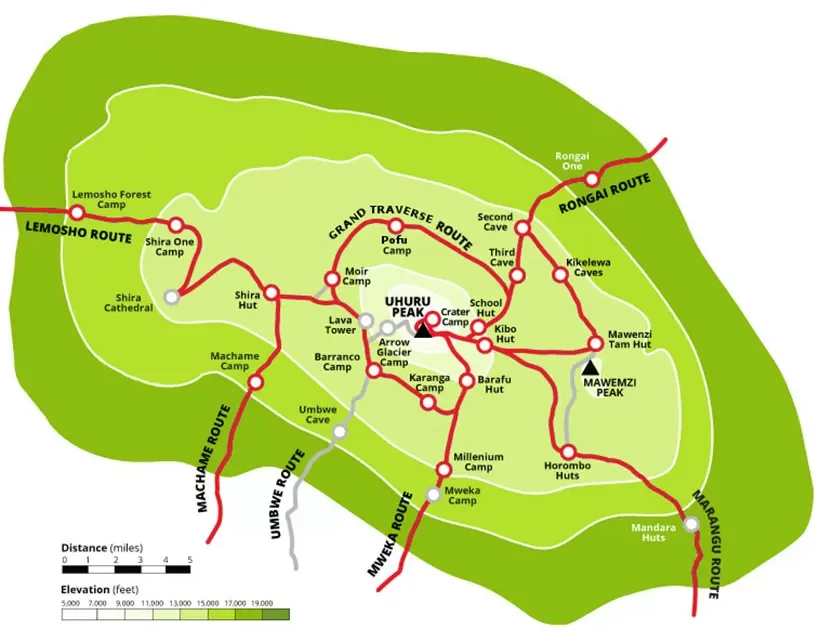
Pick up from Kilimanjaro International Airport and transfer to Moshi town which is known as the gateway to Kilimanjaro. Meet your guide and review your equipment in the evening in preparation for the trek the following day.
3 hours
About 6 km’s
Montane forest
The Northern Circuit Route begins at Londorossi Gate (2,100 meters) in the West, the same start point as the Lemosho Route. The drive to Londorossi Gate takes approximately two hours from Moshi and considerably longer from Arusha. Registration with the Kilimanjaro National Park authorities occurs at the gate and then you will be driven further up the mountain to the trailhead starting point. Most tour operators serve lunch here before the short first day trek to Mti Mkubwa Camp (2,820 meters) begins. You may get lucky and spot large wildlife like elephant and buffalo that sometimes emerge from the rainforest onto the path as you trek towards your first camp. Dinner will be served when you reach Mti Mkubwa Camp.
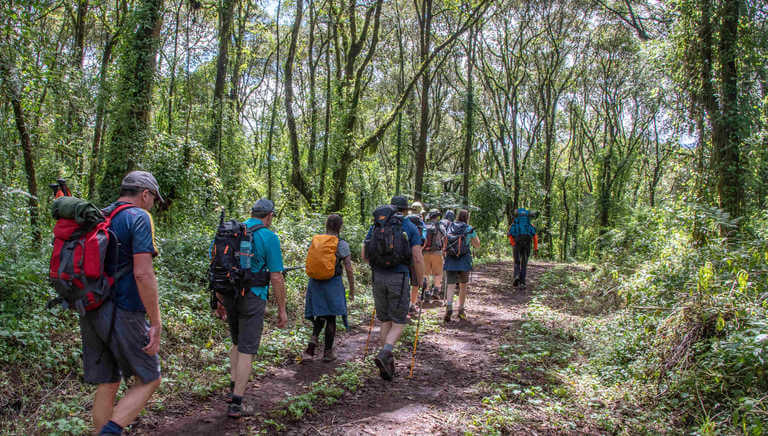
5-6 hours
About 8 km’s
Rainforest
On day three you will spend the first hour trekking through the last section of rainforest path before entering the low alpine moorland zone which follows up onto the Shira Plateau. The trek is relatively short and gradual, ending at Shira Camp 1 (3,610 meters).
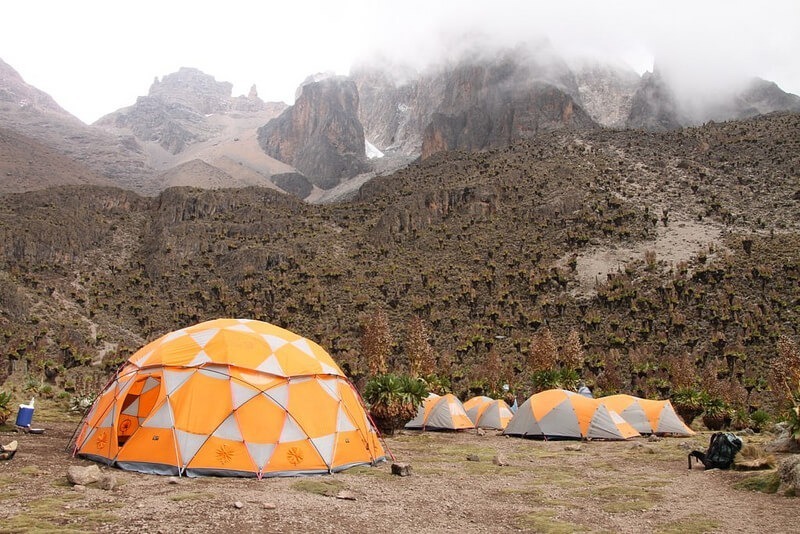
5-7 hours
About 14 km’s
Rainforest
On day four the trek crosses the Shira Plateau from Shira Camp 1 to Shira Camp 2 for lunch. Here nine day trekkers usually spend the night at Shira Camp 2 where they will join trekkers from the Machame Route. But for 8days trekkers will continue with trek heading east which passes through the ‘Garden of the Senecios’ and then enters the high alpine desert zone, then you will join the northern circuit heading down to Moir Camp at 4,200.
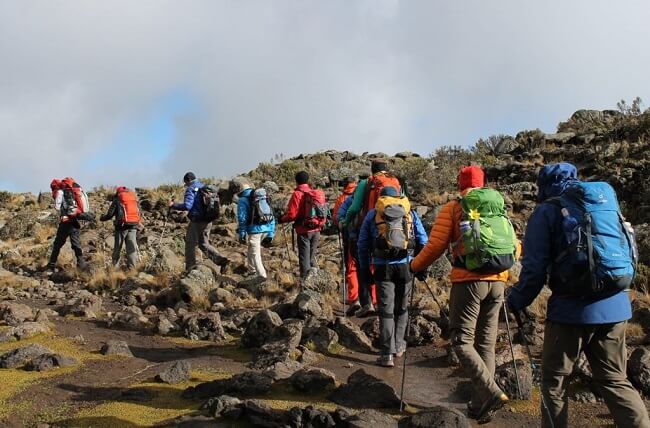
5-7 hours
About 12 km’s
High alpine zone
Day five involves a moderately steep climb out of Moir Valley. Trekkers can take a small detour here to climb the summit of Little Lent Hill at 4,375 meters before returning to the Northern Circuit trail. From here the route follows a series of inclines and declines, skirting around the northern slopes of Kibo to Buffalo Camp (4,020 meters). The trek gives great vistas out across the plains that lie north of Kilimanjaro and stretch out to the Kenyan / Tanzanian border. You will arrive at Buffalo Camp just after midday, where you will have lunch and have time to rest after a long day hiking.
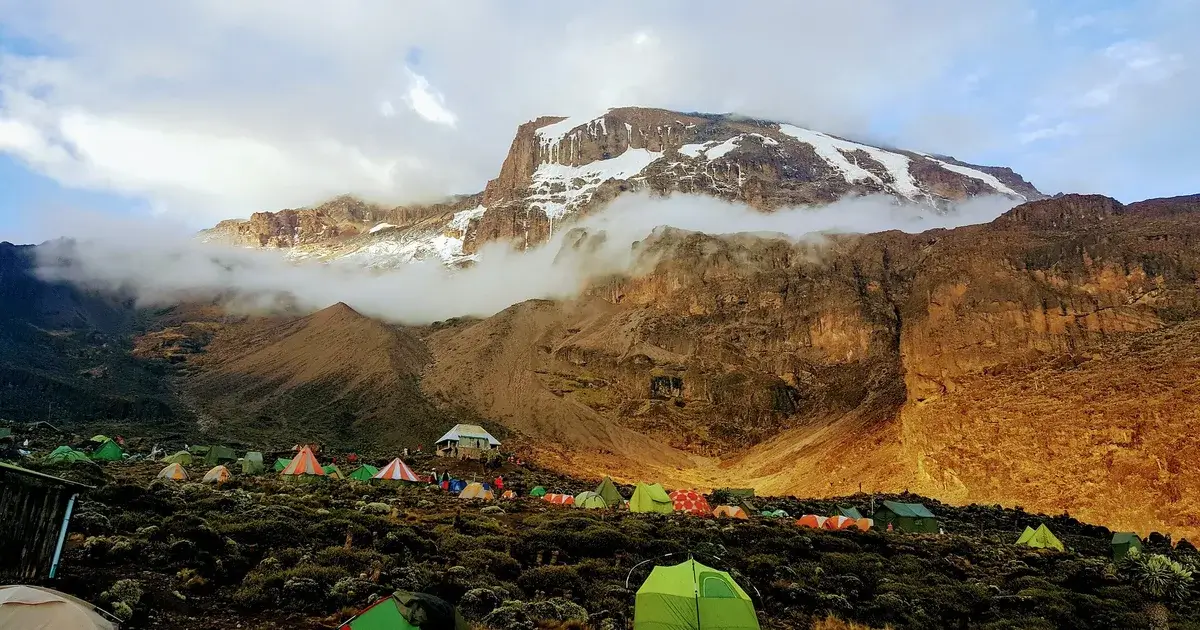
5-7 hours
About 8 km’s
Alpine desert
Day six starts with a climb up the Buffalo ridge and down into Porfu Camp where lunch is usually served. The route then continues east around the northern slopes to the Rongai Third Cave at 3,800 meters. The trek is shorter than the day before and by now you should be feeling well acclimatised to the altitude. You will arrive at the Third Cave just around mid-afternoon.
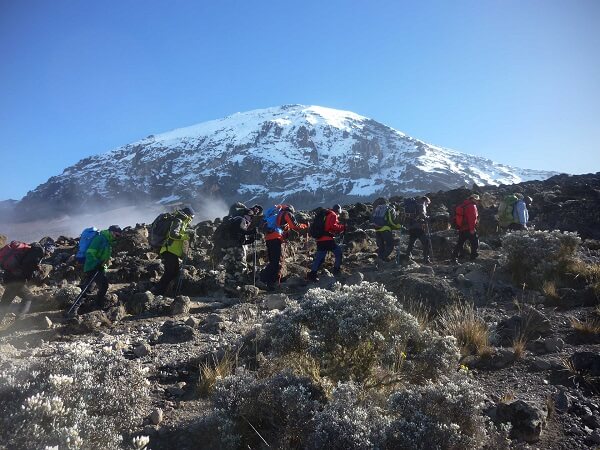
4-5 hours
About 15 km’s
High Alpine Zone
Day seven involves a steady incline up and over the Saddle which sits between the peaks of Kibo and Mawenzi Peak. Trekkers then continue walking south-west up to School Hut (4,800 meters). After arriving at School Hut you will be served an early dinner and then you should get some shut-eye as you will be awoken before midnight to start your summit attempt. Remember to prepare all your gear, including warm clothes, insulated water bottles, snacks, headlamp and camera before going to bed.
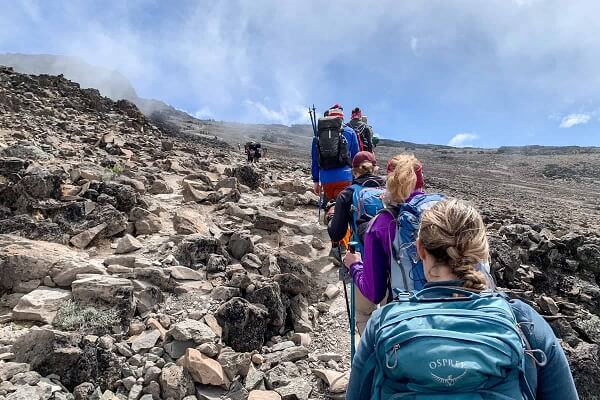
8 hours to reach Uhuru, 6 hours to descend to Millennium Camp
6 km’s ascent – 10.5 km’s descent
Glacial Zone
You will be awoken around 11:30 with hot tea and biscuits and will then begin the steep incline up the slopes of Kibo under the cover of darkness. Your first check-point is Hans Meyer Cave where you will take a short break. The climb steepens as you approach Gilman’s Point (5,681 meters), which will be around 5-6 hours after departing School Hut.
Take a moment to enjoy the approaching dawn and incredible view out and across to Mawenzi Peak, but remember you still have 2 hours trekking to reach Uhuru Peak so dig deep for the energy. The slope flattens as you head west around the crater rim and you should arrive at the summit at or just after sunrise. Your stay here will be brief so get as many pictures as you can of the incredible views and surrounding glaciers.
You will then retrace your steps back around the crater rim to Stella Point (5,739 meters) where you will turn south and head down the heavily screed slopes of Kibo to Barafu Camp (4,680 meters). Most trekkers take a short break here before continuing down to Millennium Camp (3,950 meters) for your final night on the mountain. In total you will be trekking for 14-16 hours on day eight so it is important to pace yourself, remain hydrated and keep your blood sugar levels up. Note: some tour operators return via Gilman’s Point to Horombo Hut using the Marangu Route.
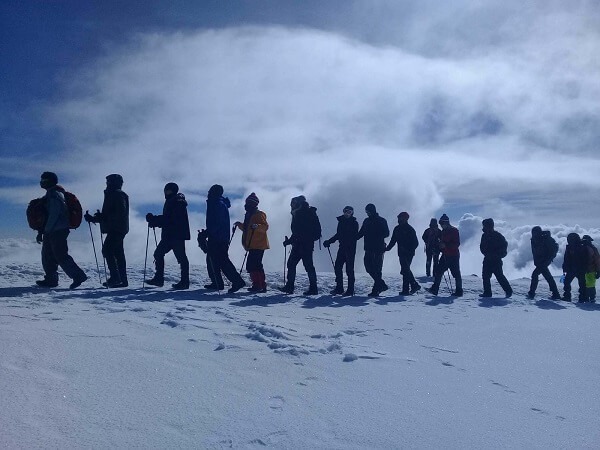
3-4 hours
10 km’s
Rainforest
The final day is a short hike through the dense montane rainforest from Millennium Camp (3,950 meters) to Mweka Gate (1,640 meters). At the gate you will need to sign-out with the authorities, who will also provide you with your official certificate – a green certificate for those who made it to Gilman’s Point and a gold certificate for those who reached Uhuru Peak.
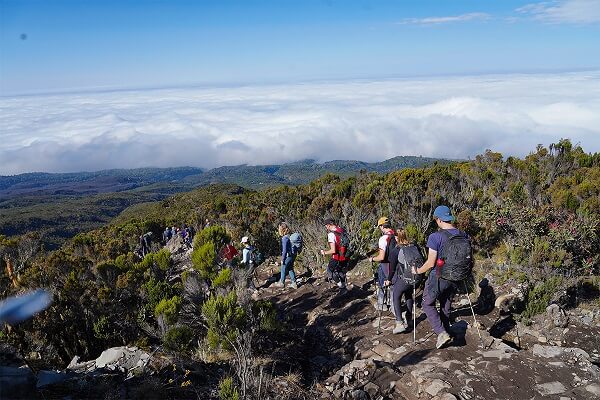

Want to plan a memorable Tanzanian adventure?
The price includes
The price does not include:
Contact us. Our Trekking Expert is always here to help


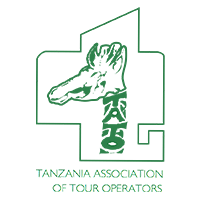

Tailor Made your Trekking

2024/2025 >> Click Here

